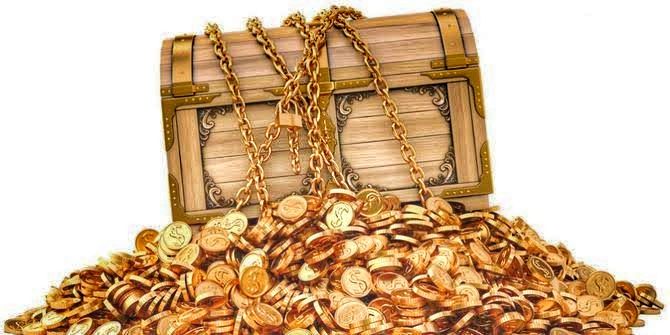4 Treasure Findings in Indonesia that Stir the World
-01.jpeg)
Nusantara not only has a long history. In the earth and the sea is also contained abundant treasures: natural wealth and the remains of civilization in the form of gold, jewelry, artifacts, coins, and other valuable objects. The potential of Indonesia as the location of hidden coffers invites a number of treasure hunters to come and seek their fortune. They untied the sea and searched the land to look for it. Here are four treasure inventions in Indonesia that are of global concern:
-. Treasure Tug Aceh Tsunami
That day, Fatimah menyisiri swamps in the Village Gampong Pande, Aceh. He is looking for oysters. Suddenly his eyes saw a box object lying in a mud puddle. The box was covered with coral and oyster. When hitting the surface, to take the oyster, the object suddenly opens. The woman was taken aback. Because, the contents of the city turned out gold coins that read Arabic script. "The coins were spilled when he opened the chest," said Abdullah, a resident of Gampong Pande, as quoted by the Daily Mail, which posted the article in 2013. The treasure is found near an ancient cemetery whose presence was revealed by the devastating tsunami waves that struck Aceh 2004. The coins found are estimated to date between 1200 and 1600 AD.
-. Prophet's Relatives?
Treasure piles lie on the seabed of Indonesia for over 1,000 years. A total of 270,000 objects including crystal, gems, ceramics, Chinese porcelain, pearls and gold were found by divers in a 10th century shipwreck 80 miles from Port of Cirebon, between the island of Borneo and Java Island. The existence of the ship at a depth of 56 meters was initially reported by fishermen who fish around the fish. Excavations were made between April 2004 and October 2005. The diver team had to make 22 thousand trips from the freighter to pick up their cargo. These divers are part of a team of collaboration results between two companies, Cosmix Underwater Research Ltd with a local company, PT Paradigma Putra Sejahtera.
-. 'The Titanic Treasure of the East'
On 12 May 1999, Australian hunter Michael Hatcher discovered the shipwreck of Tek Sing carrying 360 thousand porcelain - the greatest pottery of Chinese pottery, from the Ming Dynasty. Previously, he hired some archaeologists to study the VOC archives to dig up some important information. German media Spiegel dubbed the ship Titanic of the East or Titanic of the East because of its tragic history. On the sixth of February 1822, most of the 1,600 crew and passengers died. Human bodies are also found in shipwrecks. However, divers - originally from Indonesia - dare not disturb him. They believe, anyone who dared to harass the late will be qualified. The cargo lifted from Tek Sing was then auctioned in Stuttgart, Germany in November 2000. Because of that, Michael Hatcher was hunted by the Indonesian police because he was accused of looting valuable artifacts in the waters of the archipelago.
-. Shipwrecks of Belitung Treasure
Ships A dhow sailing ship sailing the ocean from Africa to China around 830 AD. However, when sailing home he drowned at a point of 1.6 kilometers off the coast of Belitung Island. Tilman Walterfang, a director of a German concrete company, took part in the treasure trove of millions of dollars. He dives to the bottom of the ocean. "I landed on what looks like an ordinary coral reef," Walterfang told German magazine Der Spiegel. "It's really like an underwater mound the size of a small hill formed from tens of thousands of well-preserved ceramic tiles."
The treasure has a great historical significance so that the Shanghai, Singapore and Doha parties in Qatar race each other to buy it. About 60 thousand artifacts collected Walterfang team from the bottom of the sea, including wine jugs, tea bowls with a pattern of gold, silver trophies, as well as a 1,200 year old plate. The wreck contributed to two great discoveries for archaeologists, the largest single artifacts collection of the Tang Dynasty found in shipwrecks, known as the "Tang Treasure". The second is an Arab dhow ship, which spawned a new idea that trade relations between Arabs and Chinese had been intertwined in that period.